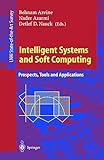Intelligent Systems and Soft Computing [electronic resource] : Prospects, Tools and Applications /
Material type: TextSeries: Lecture Notes in Artificial Intelligence ; 1804Publisher: Berlin, Heidelberg : Springer Berlin Heidelberg : Imprint: Springer, 2000Edition: 1st ed. 2000Description: XVII, 358 p. online resourceContent type:
TextSeries: Lecture Notes in Artificial Intelligence ; 1804Publisher: Berlin, Heidelberg : Springer Berlin Heidelberg : Imprint: Springer, 2000Edition: 1st ed. 2000Description: XVII, 358 p. online resourceContent type: - text
- computer
- online resource
- 9783540449171
- Artificial intelligence
- Software engineering
- Computer networks
- Application software
- User interfaces (Computer systems)
- Human-computer interaction
- Artificial Intelligence
- Software Engineering
- Computer Communication Networks
- Computer and Information Systems Applications
- User Interfaces and Human Computer Interaction
- 006.3 23
- Q334-342
- TA347.A78
Section 1 - Prospects -- From Computing with Numbers to Computing with Words—From Manipulation of Measurements to Manipulation of Perceptions -- Bringing AI and Soft Computing Together: A Neurobiological Perspective -- Future Directions for Soft Computing -- Problems and Prospects in Fuzzy Data Analysis -- Soft Agent Computing: Towards Enhancing Agent Technology with Soft Computing -- Section 2 - Tools -- NEFCLASS-J – A JAVA-Based Soft Computing Tool -- Soft Computing for Intelligent Knowledge-Based Systems -- Advanced Fuzzy Clustering and Decision Tree Plug-Ins for DataEngineTM -- Section 3 - Applications -- The Intelligent Assistant: An Overview -- The YPA – An Assistant for Classified Directory Enquiries -- Intelligent Multimodal User Interface -- Communication Management: E-Mail and Telephone Assistants -- Time Management in the Intelligent Assistant -- Machine Interpretation of Facial Expressions -- Modelling Preferred Work Plans.
Artificial intelligence has, traditionally focused on solving human-centered problems like natural language processing or common-sense reasoning. On the other hand, for a while now soft computing has been applied successfully in areas like pattern recognition, clustering, or automatic control. The papers in this book explore the possibility of bringing these two areas together. This book is unique in the way it concentrates on building intelligent software systems by combining methods from diverse disciplines, such as fuzzy set theory, neuroscience, agent technology, knowledge discovery, and symbolic artificial intelligence. The first part of the book focuses on foundational aspects and future directions; the second part provides the reader with an overview of recently developed software tools for building flexible intelligent systems; the final section studies developed applications in various fields.


There are no comments on this title.